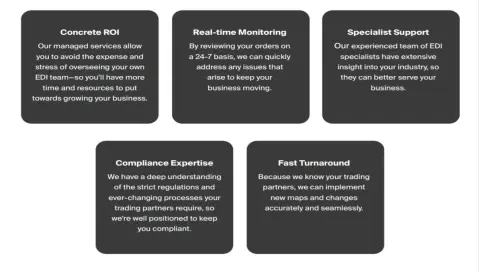En vedette dans cet article
Real Results Start with the Right EDI Partner
Real Results Start with the Right EDI Partner
21 Sept 2021
Ken Weygand
The three most important words when dealing with retail partners are electronic data interchange (EDI).
High and low-quality EDI services can be the difference between a good and lousy supplier score. Excellent or poor retailer relationships. Landing or missing out on a new business opportunity.
A lot hinges on those three words.
With so much at stake, consumer goods companies must put the proper time and devotion to finding the right EDI partner.
If, for example, you’re an ecommerce drop-ship vendor trying to do business during the coronavirus pandemic, EDI is even more critical when it comes to communicating with your retail partners. You’ll need the seamless communication EDI offers to quickly — and without data integrity issues — receive new orders and send inventory feeds, order confirmations and shipment notifications to those retailers.
The benefits of EDI have long been documented. EDI brings a higher level of compliance, faster information processing, decreased costs, improved shipping accuracy. The list goes on and on.
Not all EDI services are created equal, however.
EDI is a complex practice. Many retailers use their own unique processing rules – rules tend to shift and change. Here, we discuss some essential things to look for when choosing an EDI partner.
Make the Most of Your Time
One of the critical things to look for when choosing EDI services is whether your partner offers both managed and non-managed services.
Managed services allow you to offload all your EDI processing and management responsibilities to your EDI vendor—from map creation to map management to adjusting map specifications, to daily transaction monitoring to full technical support.
Non-managed services give you all the necessary tools you need to manage EDI, but it is up to your team to handle map creation, map management and daily transaction monitoring.
The choice is yours. There’s no right or wrong answer here. You need to set aside the time to really think about which options makes the most sense for your business.
When deciding which route to take, it’s worth considering the number of resources available. In a non-managed environment, your business will be spending money and using team resources that could be allocated towards other business activities.
This is especially true when bringing on a new retail partner that requires the creation of unique maps. Adding original documents can be a daunting task, and the repercussions of failed mapping can be far-reaching, not to mention the testing process you need to go through with a new partner. Testing the maps—running sample transactions through with the partner—is something that managed EDI services support.
The Power of Fully-Integrated EDI
There are three types of EDI products available:
Fully integrated - EDI that is fully integrated and comes with your enterprise resource planning (ERP) software. Fully integrated EDI solutions offer many advantages over add-on or independent services.
Add-on - Third-party EDI software that functions as a bolt-on and needs to be integrated into your ERP software later.
Stand-alone - Third-party EDI software that exists as a stand-alone product, separate from your ERP system.
EDI that is integrated with your ERP software streamlines your operations. It’s as simple as that.
Processing customer orders becomes more efficient and less error-prone. Purchasing information automatically flows through the supply chain, reduces chargebacks and improves retailer relationships. Using add-on or stand-alone EDI products, on the other hand, runs the risk of duplicate data in your ERP application because the data must be synchronized across all your applications. It can also lead to complex data integration issues.
Using an add-on or stand-alone EDI system can increase the number of resources needed to operate the services. With add-on EDI, the software needs to be integrated with your ERP system, adding additional costs to your project. IT resources will need to continuously monitor and manage the third-party integration to ensure there are no complications. If issues do arise, you must reach out to both your ERP and EDI providers and coordinate support services until your problem is resolved.
With stand-alone EDI services, users need to manually transfer data from the autonomous system to their core ERP system. It’s a complicated and clunky process.
Choosing add-on or stand-alone EDI means your team will need to learn a second application with its unique navigation, interface and backend – resources that could be used on more strategic projects.
Fully integrated EDI solutions have far fewer complications.
EDI Expertise You Can Trust
You want to work with an EDI provider that is an identified expert within the consumer goods industry.
EDI is used within many different sectors, from education to healthcare to automotive. You want to ensure you’re working with a vendor who has the experience and working knowledge to help your business succeed within your specific industry.
Aptean EDI experts, for example, are trained to work with small and big-box retailers, as well as manage complex mandates like vendor-managed inventory, order status reporting and inventory status inquiries. Reaching out to vendor references is a great way to get a feel for the level of expertise for any of the providers you’re considering.
Real Results Start with the Right EDI Partner
EDI is a critical part of every import and distribution company. It’s also one of the most complex software solutions. Companies like yours work with many retailers—each with their own requirements, individual compliances and unique maps. And each one of these elements has to be continuously monitored to mitigate issues that arise and make sure orders are flowing correctly.
To elevate your business performance and ensure your trading partners stay happy, choosing the right EDI service provider is essential.
Enter Aptean. Our Distribution ERP solution offers a fully-integrated EDI specifically designed for your industry. With managed and non-managed services available, our solution can flex to fit your needs. Supported by our EDI experts who know the industry inside and out, Aptean Distribution ERP helps you maintain full retailer compliance— and keep your operations running smoothly for the long-term.
Want to learn more about how the right EDI partner can propel your business forward? Here are just some of the advantages we deliver:

Aptean helps consumer goods manufacturers, importers and distributors streamline and automate their supply chain. We offer robust functionality and industry-specific tools to help you thrive in the competitive global marketplace and maximize your profitability.
Are you ready to find a true EDI partner for your consumer goods business? Let’s chat now.
Related Blog Posts


Prêt à transformer votre entreprise ?
Nous avons les logiciels sectoriels spécialisés dont vous avez besoin pour développer votre entreprise.






